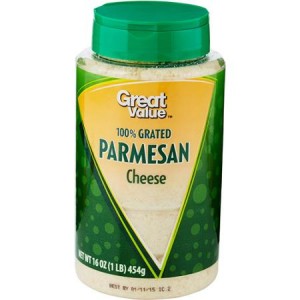 Top Class Action Lawsuits
Top Class Action Lawsuits
Pulp Reality at Walmart? If this is true, it has to be some kind of new low—even for Walmart. The discount retail behemoth got hit with a proposed consumer fraud class action this week, over claims its in-house brand of allegedly pure grated parmesan cheese contains a significant amount of fillers such as wood pulp. OMG.
So, in the spirit of, well, less is more—let’s cut through the filler and get to the allegations. Filed by Marc Moschetta of Dutchess County, New York, the Walmart parmesan cheese complaint states that the labels on Walmart’s Great Value brand grated parmesan cheese contains 100 percent parmesan cheese, and is false. The cheese is sold at Walmart stores across the US.
Are you sitting down? According to the suit, independent lab testing on the cheese product has shown it contains “significant quantities of adulterants and fillers” and between 7 percent to 10 percent of the cheese is made of cellulose, a filler and anti-clumping agent derived from wood pulp.
“Defendant makes only one marketing representation on the label: the product is ‘100%’ grated parmesan cheese [and] consumers, including plaintiff, reasonably rely on the label and believe defendant’s statement that the product consists of ‘100%’ parmesan cheese,” court documents state. “Because the product does in fact contain fillers and substitutes, the ‘100%’ parmesan claim is literally false and is also misleading to consumers.”
Moschetta stated that Walmart’s sale of the grated cheese was executed through deceptive marketing, labeling and advertising and the retailer has violated New York business laws, various consumer protection laws in a majority of the contiguous US, breached an implied warranty and benefited from unjust enrichment.
The complaint is seeking certification of both a nationwide class and a New York subclass of consumers and that Walmart be ordered to pay unspecified treble damages and punitive damages.
The case is Moschetta v. Wal-Mart Stores, Inc., number 7:16-cv-01377, in the U.S. District Court for the Southern District of New York.
O Lord, won’t you Give me a Clean Diesel Car? Mercedes, seemingly the only automotive maker not be sued for defective airbags, ignition switches and/or uncontrolled acceleration—to name but a few issues among the litany of defective automotive class actions currently winding their way through the courts, found itself on the end of a consumer fraud class action lawsuit this week.
What for, you ask? Allegations the company knowingly programs its Clean Diesel vehicles to emit illegally high levels of nitrogen oxide. Specifically, the Mercedes emissions lawsuit claims that like Volkswagen defeat devices certain Mercedes models contain a device that causes the vehicles to violate US emissions standards when run at cooler temperatures, making them less environmentally friendly than advertised.
The lawsuit was filed by a Mercedes owner in Illinois, who claims the automaker uses the device in its BlueTec cars to turn off a system meant to reduce nitrogen oxide in its exhaust. The law firm representing the plaintiff said in a statement that on-road testing had shown Mercedes’s Clean Diesel cars produced average on-road NOx emissions that were 19 times above the U.S. standard, with some instantaneous readings as high as 65 times more than the US limit.
According to the complaint, the device in Mercedes’s diesel models turns off pollution controls at temperatures below 50 degrees Fahrenheit (10 Celsius), allowing the autos to violate emissions standards.
Further, according to a study done by independent testing agency TNO for the Dutch Ministry of Infrastructure and the Environment, in real-world testing, the Mercedes C-Class 220 emits more nitrogen oxide than measured in laboratory results.
“Mercedes never disclosed to consumers that Mercedes diesels with BlueTEC engines may be ‘clean’ diesels when it is warm, but are ‘dirty’ diesels when it is not,” according to the complaint. “Mercedes never disclosed that, when the temperature drops below 50 degrees, it prioritizes engine power and profits over people.”
The lawsuit also contends that even if Mercedes is able to make the cars compliant with emissions standards, those who drive them will suffer harm because the vehicles won’t perform as promised or advertised.
The plaintiff is seeking to represent a nationwide class of includes all US-based residents and entities that bought or leased an affected vehicle as of this month, and a court order compelling Mercedes to recall the affected models or replace them for free, in addition to unspecified damages.
Among the enumerated models are Mercedes’s ML320 and 350 sport utility vehicles, its E- and S-Class cars, and GLE crossovers.
The lawsuit is Lynevych v. Mercedes-Benz USA, U.S. District Court, District of New Jersey.
Top Settlements
Pyrrhic Victory for Talc Powder Ovarian Cancer Victim. Here’s a stunner—in more ways than one—and it’s just the beginning for J&J. This week saw $75 million in damages awarded against the company in a lawsuit suit alleging the talcum powder Jacqueline Fox used caused her to develop ovarian cancer.
Fox claimed that for over 35 years she had used baby powder made by J&J and another talc product for feminine hygiene until she was diagnosed with ovarian cancer. She passed away at the age of 62, on October 6, 2015.
Her case was heard by a jury in St. Louis, Missouri, and is just one of more than 60 cases consolidated into a single suit alleging cancer caused by talcum powder.
During the trial, Fox’s attorney presented a document which revealed J&J knew their talcum powder was causing cancer. The letter, dated from 1997, was by a former J&J consultant and it warned the responses by the company to findings from no less than nine scientific studies could result in the talc industry being compared to the cigarette industry.
While the jury found 10-2 against J&J on claims of failure to warn, negligence and conspiracy, it did not find talc manufacturer Imerys Talc America Inc, another defendant, liable.
Another woman is scheduled to go to trial on April 11, 2016. Attorneys for Fox said that J&J is currently facing hundreds of lawsuits over talcum powder use.
Lawsuits have been filed against some talc companies alleging talc powder contains asbestos and consumers were not adequately warned about the risk of asbestos in talc powder. Although home talcum products are supposed to be asbestos-free, there are concerns some talcum products still contain asbestos. Furthermore, it can take decades for exposure to asbestos products to result in mesothelioma and other illnesses, meaning people who were exposed in the 1970s may still be diagnosed with asbestos-related illnesses.
Ok…So, that’s a wrap folks… Cocktails are in order—see you at the Bar!

 Top Class Action Lawsuits
Top Class Action Lawsuits Top Class Action Lawsuits
Top Class Action Lawsuits Top Class Action Lawsuits
Top Class Action Lawsuits